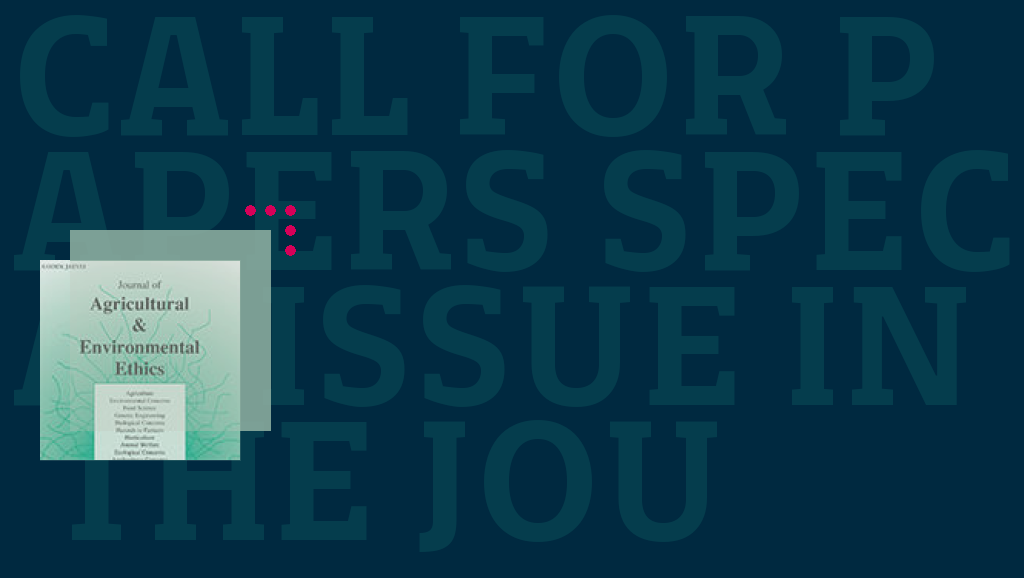Special Issue in the Journal of Agricultural and Environmental Ethics
The Normative Dimension of Transformations towards a Sustainable Bioeconomy – Expanding the Economic Perspective
The editors invite papers for a special issue which will focus on the ethical aspects to be considered in a transformation to a sustainable bioeconomy.
Motivation
Recent discussions have shown that the pressing problems and complex challenges humanity is currently facing cannot be adequately tackled by approaches that neglect or oversimplify the normative dimension of sustainability transformations (see also Schlaile et al., 2017). One example of a currently popular solution strategy which also tends to disregard the complexity of this normative dimension is the bio-based economy or bioeconomy. Globally, many political initiatives promote the transformation towards a bioeconomy with the aim of overcoming our dependence on limited fossil resources and to combat climate change (see also Pyka, 2017). This has long been widely regarded as a purely technical challenge. However, questions of how to meet global demands of food, health, material, and energy must be tackled synchronously with issues of human rights, social inclusion, fitness for future, and the question of “how do we want to live”. A transformation towards a bioeconomy raises, for instance, ethical issues of inter- and intra-generational equity (Murray et al., 2017). Furthermore, customer demand for bio-based projects is often lacking (Verbong and Geels, 2007), and the assumed characteristics of the biosphere and the economic sphere as parts of a biobased future remain unexpressed (Zwier et al., 2015). This raises questions how a responsible bioeconomy should look like (Inigo and Blok, 2019). Isolated research about the technical feasibility on the one hand and ethical normativity on the other without a profound understanding of the complex socio-economic processes that connect the two realms, will undoubtedly be futile. Consequently, interdisciplinary reflection is needed that brings together philosophers, economists and other social scientists, sustainability researchers, cultural evolutionists, and complexity scientists to advance the debate. The special issue is open for all interested researchers but simultaneously intended to publish the proceedings of an interdisciplinary workshop that was organized around this topic at the University of Hohenheim on September 13-14, 2019. Hence, this special issue is meant to give a voice to all researchers who can contribute to this endeavor.
Topics
Relevant topics include but are not limited to:
• Cultural evolution and competition of worldviews in relation to sustainability and bioeconomy
• Relevant actors and leverage points for systemic transformations towards a sustainable bioeconomy
• Reframing and re-conceptualizing bioeconomy beyond a techno-economic idea towards a normative process
• The interplay of social, technological, and system innovation for a sustainable bioeconomy
• How to achieve a dedication to sustainability in bioeconomy-related innovation processes?
• The ethical implications of different ideas about the relationship of the biosphere and the economic sphere
Submission
Accepted papers will have a length of up to 10.000 words.
Authors are advised to use the online manuscript submission for the journal. Make sure to select the special issue when asked to provide the article type. More information, including formatting instructions for authors can be found on the journal’s webpage.
Authors are requested to send a brief email to the Guest Editors indicating their intention to participate as soon as possible, including their contact information and the topic they intend to address in their submission. Questions regarding the special issue should be sent to the same address.
Important dates
Submission deadline: 30 June 2020
Intended publication: Q1 2021
Guest Editors
Vincent Blok, Wageningen University (vincent.blokatwur.nl),
Michael Schlaile, University of Hohenheim (schlaileatuni-hohenheim.de)
Sophie Urmetzer, University of Hohenheim (sophie.urmetzeratuni-hohenheim.de)
—————
















